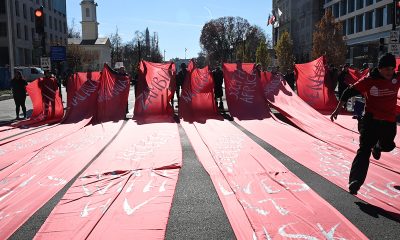Local
Md. state senator says casino firm paid for NGLTF gambling mailer
LGBT advocacy group says ballot measure on gambling will hurt marriage equality vote
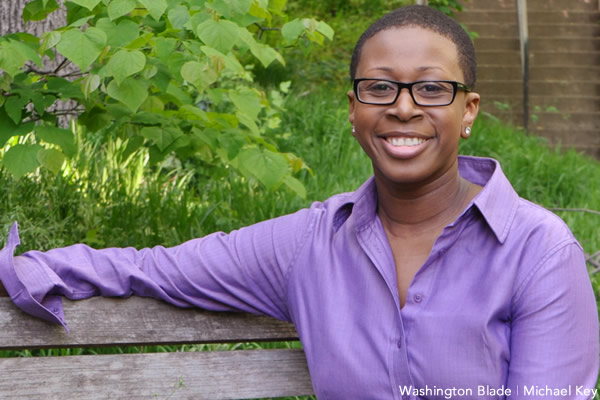
A state senator in Maryland told the Washington Post that the Penn National Gaming company paid more than $340,000 for a mailing that the National Gay & Lesbian Task Force sent to Maryland households in August opposing a bill to expand gambling in the state.
According to the Post, Sen. C. Anthony Muse (D-Prince George’s County), who voted against Maryland’s same-sex marriage law, said a Penn National vice president told him the casino company gave the money for the mailer to the DCI Group, a D.C. based consulting firm. The Post reported that Muse said the DCI Group then gave the money to the Task Force.
At that time, Monique Hall, a member of the NGLTF Action Fund board of directors, also served as a vice president for the DCI Group, a Republican-leaning consulting firm. Sources familiar with DCI Group told the Blade in August that DCI had been retained by one of the Maryland casinos to campaign against the gambling bill.
Hall, DCI Group, and Penn National have not responded to calls from the Blade seeking comment. NGLTF spokesperson Inga Sarda-Sorenson could not be immediately reached for comment.
The gambling bill calls for allowing a sixth casino to operate in the state in Prince George’s county and would allow casinos approved for five existing sites in Maryland as well as the one in P.G. County to operate table games. The existing sites are currently required to operate only slot machines.
Casino owners involved with the five existing sites, including Penn National, are vehemently opposed to allowing a new casino to open in P.G. County, saying the new casino would take away customers from their locations. They have spent millions of dollars on TV commercials calling on voters to vote no on the gambling expansion measure on the November ballot.
At the time it sent out its mailing in August, NGLTF said the gambling bill, introduced by Gov. Martin O’Malley, would be detrimental to efforts to save the state’s same-sex marriage law, which will come before voters in a referendum in the November election.
NGLTF noted that if the Maryland General Assembly approved the gambling bill – which it did in late August — it would come before voters in a referendum in November at the same time that the state’s marriage equality law appears on the ballot in a separate referendum.
The group noted that a gambling referendum would likely attract a larger than usual number of conservative voters to the polls who oppose both gambling and gay marriage. This would make it more difficult for marriage equality advocates to persuade voters to cast their ballot in support of same-sex marriage, the Task Force argued.
“We do not have a position on gambling, but rather on marriage equality,” NGLTF Deputy Executive Director Darlene Nipper said in a statement released in August.
“The purpose of the marriage equality mailer, funded by the Task Force Action Fund, which like other nonprofits includes many donors, some named and some who are not, is to get marriage equality over the finish line,” Nipper said. “It was sent to a portion of registered Democratic households in Maryland.”
NGLT has declined to disclose who paid for the expensive mailer, saying only that it was funded by contributors to its Action Fund, which gets involved in political campaigns in support of LGBT equality.
Josh Levin, campaign manager for Marylanders for Marriage Equality, the organization leading the effort to uphold the same-sex marriage law, said the group’s internal polling has shown that a gambling referendum would have no impact on the marriage equality vote.
“We’ve been looking at this carefully for a long time and have yet to see any data that suggest there are any voters who would come out in the election because of the gaming initiative who were not already going to be out for a presidential election or to vote on the question of marriage equality,” he told the Blade.
However, at least one pollster, speaking on condition of anonymity, said a gambling referendum could bring out more conservative voters than usual, despite the relatively high turnout expected for a presidential election.
Gay Republican strategist Tom Synhorst, the founder and chair of the DCI Group, also did not respond to a request by the Blade for comment on what specific role DCI is playing in the campaign to oppose the gambling bill or whether it acted as a conduit for transferring funds for the NGLTF mailer from a gaming company.
The DCI website describes it as a public affairs company that “Helps corporations navigate their most challenging political, legislative and regulatory problems anywhere in the world.”
Maryland
FreeState Justice launches 501(c)(4) group
FreeState Equality will focus on policy and advocacy
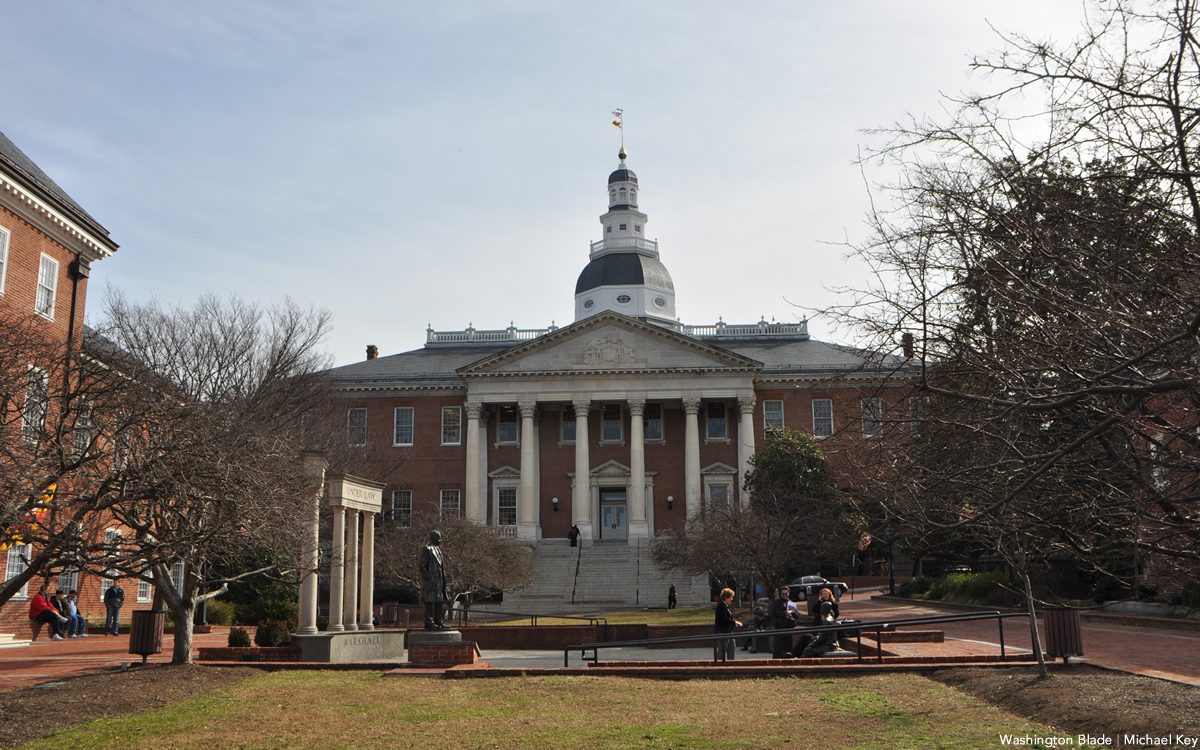
FreeState Justice, an LGBTQ organization that provides legal services, community programs, and public education in Maryland, announced the launch of FreeState Equality on Wednesday.
The new, independent organization intends to pursue advocacy and policy work beyond the legal capability of FreeState Justice, a 501(c)(3) non-profit. FreeState Equality functions as a 501(c)(4) organization, meaning it can partake in political activity.
“We are committed to transparency throughout this process and look forward to continuing our work together in service of LGBTQ+ Marylanders,” said FreeState Justice Executive Director Phillip Westry.
FreeState Equality will take on policy, advocacy, and civic engagement initiatives while FreeState Justice will pursue legal and direct-service work, according to Westry.
While both organizations adhere to similar values, they will feature separate leadership, operations and compliance.
FreeState Equality is hosting its first launch fundraiser on Dec. 10 at the Brass Tap in Baltimore. The event, held from 5-7 p.m., will feature insight from FreeState Equality staff about how Maryland policy can support the state’s LGBTQ community.
Attendees can purchase fundraiser tickets on Zeffy for $25 general admission, which includes a free first drink. The organization also welcomes additional donations.

By LEE O. SANDERLIN, PAMELA WOOD and BRENDA WINTRODE | Maryland House of Delegates Speaker Adrienne A. Jones, the first woman and first person of color to hold her position, stepped down from her leadership post Thursday, effective immediately.
Jones, 71, has been a member of the legislature since 1997 and ascended to the top role in 2019 following the death of longtime House Speaker Michael E. Busch.
Jones held a meeting with top House Democratic leaders Thursday afternoon, sources said, at which she informed them of her decision. In a statement, Jones described the changes of life’s seasons and said she was ready to focus on what lies ahead.
The rest of this article can be found on the Baltimore Banner’s website.
District of Columbia
Activists praise Mayor Bowser’s impact on city, LGBTQ community
‘She made sure LGBTQ residents knew they were seen, valued, loved’

Members of D.C.’s LGBTQ community offered their thoughts on the impact Mayor Muriel Bowser has had on them, the city, and LGBTQ people in statements and interviews with the Washington Blade in the week following Bowser’s announcement that she will not run for re-election in 2026.
Bowser’s Nov. 25 announcement came during the third year of her third four-year term in office as mayor and after she served as a member of the D.C. Council representing Ward 4 from 2007 to Jan. 2, 2015, when she took office as mayor.
The LGBTQ activists and mayoral staffers who spoke to the Blade agreed that Bowser has been an outspoken and dedicated supporter on a wide range of LGBTQ-related issues starting from her time as a Council member and throughout her years as mayor.
Among them is one of the mayor’s numerous openly LGBTQ staff members, Jim Slattery, who has served in the Cabinet-level position as the Mayor’s Correspondence Officer since Bowser first became mayor.
“As Mayor Muriel Bowser’s longest serving LGBTQIA+ staffer – dating back to her first term as the Ward 4 Council member – and a proud member of her Cabinet since day one of her administration, I have had the opportunity to witness her at work for the people she serves and leads,” Slattery said in a statement. “Noteworthy is that throughout the entirety of my 27 years in District government, I have always been able to do so as an out and proud gay man,” he stated.
Slattery added that he has witnessed first-hand Bowser’s “absolute belief” in supporting the LGBTQ community.
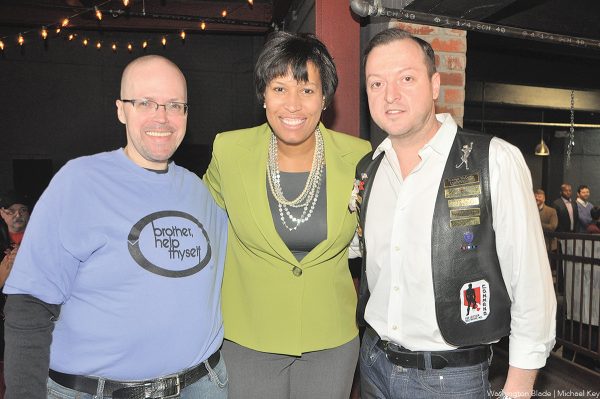
“She has led on HIV/AIDS prevention and treatment, on shelter for vulnerable members of our community, housing for older members of the community, and has been a reliable and constant presence at events to LGBTQIA+ residents,” Slattery said. Among those events, he said, have been World AIDS Day, the D.C. Pride Parade, the 17th Street LGBTQ High Heel Race, and WorldPride 2025, which D.C. hosted with strong support from the mayor’s office.
Ryan Bos, CEO & president of Capital Pride Alliance, the D.C. group that organizes the city’s annual LGBTQ Pride events and served as lead organizer of WorldPride 2025, praised Bowser for being a longtime supporter of that organization.
“She played a very supportive role in helping us as an organization grow and to be able to bring WorldPride to Washington, D.C.,” Bos told the Blade. “And we commend her years of service, And our hope is that she helps us to continue to advocate for the support from the D.C. government of the LGBTQ+ community, especially during these times,” Bos said.
Bos, who was referring to the Trump administration’s hostility toward LGBTQ issues and sharp cutbacks in federal funds for nonprofit organizations, including LGBTQ organizations, said Capital Pride Alliance appreciated Bowser’s efforts to provide city funding for events like WorldPride.
“She provided support through the event process of WorldPride and ultimately along with the D.C. Council provided necessary funding to ensure WorldPride was a success,” Bos said. “And we are proud that we are able to show that Capital Pride and WorldPride had such a large economic impact for D.C. and the D.C. government,” he added.
Marvin Bowser, Mayor Bowser’s gay brother who operates a local photography business and has been active in the D.C. LGBTQ community for many years, said he has also witnessed first-hand his sister’s support for the LGBTQ community and all D.C. residents since the time she became a Council member and even before that.
Among his vivid memories, he said, was his sister’s strong support for the marriage equality law legalizing same-sex marriage in D.C. that the Council approved in 2009 under then-Mayor Adrian Fenty.
“I remember the first time she was standing up and giving clear and unequivocal support to the community when that law passed,” Marvin Bowser told the Blade. “And she was front and center in speaking very strongly in support of marriage equality,” he said.
Marvin Bowser also credits his sister with expanding and strengthening the then-Mayor’s Office of GLBT Affairs, among other things, by appointing advocate Sheila Alexander Reid as the office’s director in 2015.
Reid, who for many years prior to becoming director of the GLBT Affairs office was founder and publisher of the national lesbian publication Women In The Life, had the reputation of a “rock star,” according to Marvin Bowser.
He recalls that Mayor Bowser also played a lead role in D.C.’s bid to host to the quadrennial international LGBTQ sports competition Gay Games for 2022.
D.C lost its bid for the 2022 Gay Games after the Federation of Gay Games selected Hong Kong to host the event in an action that Marvin Bowser says was unfair and based on the effort to hold the Gay Games for the first time in Asia even though D.C. had a stronger bid for carrying out the event.
“Everything she’s done for the community has been very visible and from the heart,” he said of Muriel Bowser. “And in my personal relationship with her, she has also been nothing but absolutely supportive of me and my partner over the years,” he said.
“And we were just at her house helping her put up Christmas decorations,” he added. “And so, it’s been wonderful having her as a sister.”
Veteran D.C. LGBTQ advocate Japer Bowles, who serves as the current director of the Mayor’s Office of LGBTQ Affairs, discussed the mayor’s record on LGBTQ issues in his own statement to the Blade.
“Mayor Muriel Bowser has been an unwavering champion for D.C.’s lesbian, gay, bisexual, transgender, queer, intersex, and asexual community and movement,” he said. “Her more than 20 years of leadership brought consistent and historic investments for our LGBTQIA+ youth, seniors, veterans, and residents experiencing homelessness as well as impactful violence-prevention initiatives,” he added.
“Under her leadership, the Mayor’s Office of LGBTQ Affairs grew into a national leader, delivering more than $10 million in community grants for LGBTQIA+ programs and managing 110 Housing Choice vouchers,” Bowles said in his statement.
“Because of her work, we are stronger, safer, more visible, and, proudly, ‘the gayest city in the world,’” he said in quoting Bowser’s often stated comment at LGBTQ events about D.C. being the world’s gayest city.
In a statement that might surprise some in the LGBTQ community, gay D.C. small business owner Salah Czapary, who served from 2022 to 2024 as director of the Mayor’s Office of Nightlife and Culture as a Bowser appointee, criticized some of the city’s non-LGBTQ related polices under the Bowser administration as being harmful to small businesses.
Bowser appointed Czapary, a former D.C. police officer, to the nightlife office position shortly after he lost his race as an openly gay candidate for the Ward 1 D.C. Council seat held by incumbent Brianne Nadeau.
“Mayor Bowser led D.C. through turbulent years and major growth, and we can all be proud of her leadership on many fronts,” Czapary said in a statement to the Blade. “She is also setting an example that more leaders should follow by stepping aside to allow a new generation to lead,” he said. “But as we turn the page, we must be honest about what the next mayor should deliver,” he says in his statement.
Without mentioning Bowser by name, he went on to list at least four things the next mayor should do that implied that Bowser did not do or did wrong. Among them were treating the D.C. Council as a “true governing partner,” not letting residents and small businesses “feel the weight of outdated, slow, and unresponsive systems,” and the need for leadership that “values competence over loyalty.”
He added that a “reversal” by the city of the city’s streetery program that was put in place during the COVID pandemic to allow restaurants to install outdoor seating into street parking lanes, was a “roll it back” on progress for small businesses.
He concluded by stating, “LGBTQ rights and inclusion are among the many fronts on which we can be very proud of the mayor’s leadership.”
The mayor’s office did not immediately respond to an offer by the Blade to give the office an opportunity to respond to Czapary’s statement.
A significantly different perspective was given by Sheila Alexander Reid, who said she was proud to serve as director of the Mayor’s LGBTQ Affairs Office during the first six-and-a-half years of Bowser’s tenure as mayor.
“I watched her evolve from a newly elected mayor finding her footing into a confident, seasoned leader who met every challenge head-on and time after time slayed the competition,” Alexander Reid said in a statement to the Blade.
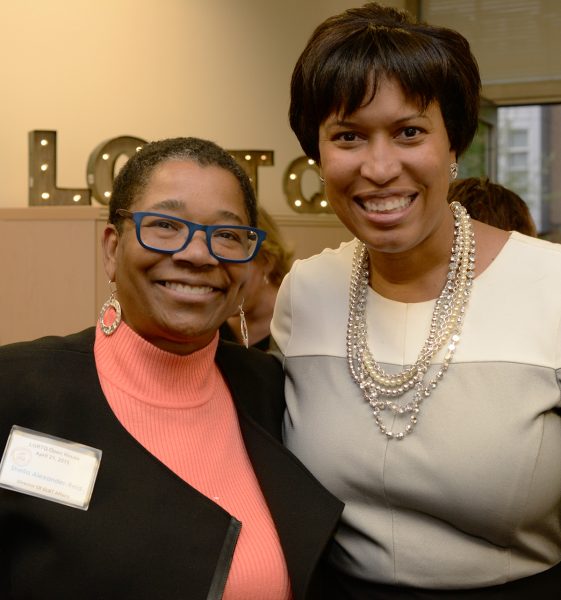
“With each year in office, her voice grew stronger, more grounded, and more fearless,” her statement continues. “And she needed that strength, because being a Black woman mayor is not for the faint of heart, But Mayor Bowser never backed down. Instead, she showed the city what courageous, compassionate leadership truly looks like.”
Alexander Reid added that Bowser funded a new LGBTQ Community Center facility, expanded a workforce development program for the transgender community, and “made D.C. the first jurisdiction in the nation to require LGBTQ+ cultural competency training for healthcare providers.”
She also pointed to the mayor’s LGBTQ “safety nets” through low-barrier shelters and housing vouchers and her support for LGBTQ celebrations like the 17th Street High Heel Race.
“But what inspired me most was this,” Alexander Reid stated. “At a time when some elected officials across the country were retreating from LGBTQ support, Mayor Bowser was doing the opposite. She leaned in, she doubled down. She made sure LGBTQ residents knew they were seen, valued, protected, and loved by their city.”
-

 The White House2 days ago
The White House2 days ago‘Lavender Scare 2.0’: inside the White House’s campaign against LGBTQ federal employees
-

 District of Columbia4 days ago
District of Columbia4 days agoHIV/AIDS activists block intersection near White House
-

 a&e features2 days ago
a&e features2 days agoMeet Mr. Christmas
-

 Japan4 days ago
Japan4 days agoTokyo court upholds Japan’s same-sex marriage ban

















